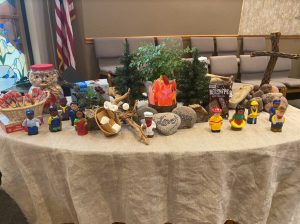Caring for the Animals
July 15, 2022
in Pastor's Weekly Message
This month in worship, we have been exploring the themes from our Vacation Bible School curriculum. Each scripture passage focuses on one of the stories of food in the Bible. Many of these passages revolve around bread, but this week is different. In this week’s story, Daniel and his friends choose a vegetarian lifestyle over the opulent and rich diet of the Babylonians in the King’s court.
This has renewed my desire to live a vegetarian or even vegan life. I’m not very committed to this life, I have to admit. I’ve toyed with it since college. In fact, in seminary I wrote a paper about God’s original command in Genesis to eat a vegetarian diet. It was only after The Fall that humans were allowed to eat meat. It’s an intriguing argument that was fun to research and develop, but it didn’t change my food choices for long.
While I believe that all food has been given to humans to eat and enjoy, I also believe that God never intended us to treat animals with the cruelty and inhumanity that we do in our current practices. I prefer to embrace the Native American practices of the Tlingit people and others, who believe in honoring the animal who gives their life for us. Traditionally they use every part of the animal, and return what little is not used to the earth with honor. This is a far cry from the factory farming practices we see today.
In addition, I also believe that we have moved from the occasional splurge of meat consumption to the belief that we must eat meat for three meals of the day. In fact, our own food habits are actually quite opulent compared to the rest of the world. Shrimp every day? Lobster at the grocery store in the desert? Steaks on the grill? How opulent! Our meat consumption has edged out consumption of fruits and vegetables, and leads to health problems such as obesity and heart disease and more. It also leads to all sorts of environmental problems. Some studies show that the effects of cattle farming are more devastating to our environment than our gas cars and airplanes.
But it’s hard to be vegetarian and vegan. The “Standard American Diet” of meat and carbs is much easier to maintain. It’s easier on my rushed days of preparing dinner to cook a chicken breast or a hamburger than to figure out what vegetables we have and what a meal might look like. Plus, one kid is vegetable-averse, so a vegetarian meal is not popular!
I don’t have answers to my dilemma. I desire to be vegan, to not eat meat or dairy products, and I fail daily. But what steps can I take in that direction? How can I move closer to that lifestyle? There are many small choices I can make. Institute Meatless Mondays. Embrace “VB6,” a choice to eat Vegan Before 6, or only eat meat products for the last meal of the day. Choose to source my meat and fish from small farmers. Choose a vegetarian option when I’m eating out to encourage restaurants to continue to offer these options. There are many small steps I can make that will move us to embrace vegetables a little more, as Daniel did.
What about you? What choices can you make this week that can cut down your meat consumption for health and environmental reasons? How can you follow in Daniel’s footsteps and choose vegetables and water instead of a more opulent menu? Maybe you’ll never be vegan, but surely Daniel’s example can encourage us to better choices. May God bless us all as we go against our culture and our habits for the good of the earth and our health.
See you soon.
Pastor Lynn
WORSHIP SCHEDULE
- 8:30 a.m. Traditional service in Sanctuary and child care in Rm 15
- 10 a.m. Traditional service in Sanctuary
- 10 a.m. Youth and children’s Sunday School and child care
- 10 a.m. Livestream premieres on YouTube and Website
To access our livestream service:
- From the main menu on our website click “Worship.” -OR-
- Go to YouTube and search for UMC St. Mark’s Oro Valley or use this link.

